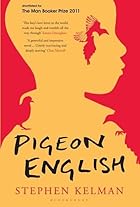 Pigeon English by Stephen Kelman is the latest book read by my book group. There were about 8 of us present for the meeting and the response was a mixed bag.
Pigeon English by Stephen Kelman is the latest book read by my book group. There were about 8 of us present for the meeting and the response was a mixed bag.When I came to write my review I simply wrote ? as I could not initially put into words just what I wanted to say. Furthermore, the question asked of the group was " What made this a Booker Prize winner"
The book is cleverly written, through the eyes of a young boy aged 11, who has moved to England from Ghana with his mother. He lives on a London housing estate which is about as far removed from his home as it could be.
Sadly, there has been a murder and in a rather naive way the boy seeks to explore how the murder occured and by whom. The narrator is a pigeon who the young boy uses as a mechanism in which to explore his inner throughts and worries.
A series of passages from the book caught my attention and I shall them with you all here
"The best bit is running in the rain. If you point your face up to the sky at the same time as running, it nearly feels like you’re flying. {...} just run as fast as you can. At first you’re scared of crashing into something but don’t let it put you off. Just run. It’s easy. The rain on your face and the wind makes it feel like you’re going superfast. It’s very refreshing. I dedicated my rain run to the dead boy."
"Scars look better on white people" (page 84)
" The dead boy's blood is all gone now, the rain washed it off" (page 35)The writing was authentic and emotive and I pondered if a 11 year old boy could have written this. I further debated, that children from parts of Africa where such dreadful famine happens and is endured, seem see death and dreadful things on a very different level to children from first world Countries. They almost start with different values. They view these brutal ways and the brutality of death as a simple fact.
I am still not sure if I enjoyed the book or not. I was cleverly written and I think has the wow factor that is required by Booker Prize winners.
The end of the book reveals a clue to the catalyst for writing such a book. A young boy called Damilola Taylor, an immigrant from Nigeria and living in London with his sister and mother whilst his father remained in Nigeria. The family had come to England in order to receive medical care for the sister who had severe epilepsy. In 2000, young Damilola was murdered on the streets of London. The offenders were children themselves and the events shocked the nation.
That was the catalyst for this book being written. Now, I am not sure that I am OK, with a fictional book becoming a success on the back of a pointless tragedy. I think I would have been happier if the work had been non fiction. Irrational perhaps, but that is my preference.
The final pages of the book lists the details for the Damilola Taylor Trust.
The whole book group meeting was especially interesting and informative and I think was one of the best sessions.
No comments:
Post a Comment
Hello! Thanks for stopping by and choosing to leave a message. I read every message and I usually reply via the comment thread. Posts are currently moderated due to the sudden influx of spam postings!